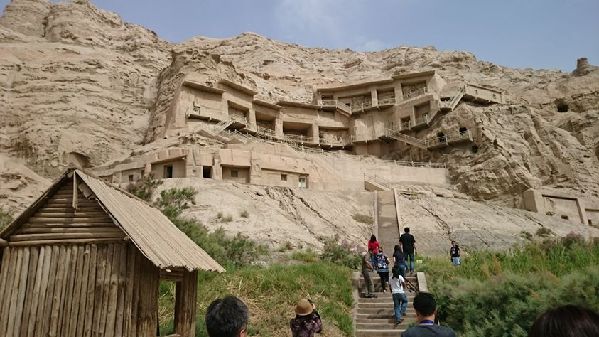Xinjiang, first hand: Scorching Urumqi, Jiaohe Ruin City & the Blazing Turpan
- By Danny Lee
 0 Comment(s)
0 Comment(s) Print
Print E-mail CRI, November 27, 2015
E-mail CRI, November 27, 2015
|
|
|
The Kizil cave Temples |
I had expected Xinjiang to be hot in summer. But not that hot!
On the day I arrived in Urumqi, capital of the Xinjiang Autonomous Region, it was a glaring 44 degrees Celsius. The hot sun obliterated everything as I dashed from my plane to the tarmac bus. When I met my Beijing colleagues for dinner that evening, I was warned that the journey is going to get even hotter.
Before I turned in for the night, my last memory was the CCTV weather report, which came up at the end of the news bulletin. I remembered staring at a map of China, with the Xinjiang Region marked in bright red. The Weather Reporter had cheerfully reminded us that China is going through record high temperatures this summer, with Xinjiang proudly at the top. Phew!
The early morning cool melted dissipated very quickly, as we visited the Turpan Basin the following day. Turpan is remembered in history for two main things. The first is its top quality fruits, with its superb grapes taking the crown. The second is Flaming Mountains or 火焰山 - made famous by the Chinese classic, Journey to the West or 西游记.
Our first stop is the ancient Jiaohe Ruin City in Yarnaz Valley, just 10km West of Turpan City. Tracing its origins back to 1800BC, Jiaohe reached its prime around 180BC, ruled by several tribes and ethnic groups, before it was abandoned to the heat. I can still vividly recall the simmering hills are etched in my mind, as we toured the ruins in a searing 47 Celsius heat. If you think incubators are warm, remember that they are set at 37.5 Celsius - that's almost 10 degrees Celsius cooler than we had that day.
Moving around without protective head-wear was not an option, not when the surface temperature soared to around 70 degrees Celsius. Many of my fellow travelers had obviously arrived at the same conclusion, as we crowded round the stalls selling hats and caps. I decided that the straw hat was the best, as it allowed what little breeze to cool the head.
Miraculously, we spent about 45 minutes touring the ruins, without getting cooked. Although we felt at least medium rare at the end of it. As I tried to clean the perspiration that was streaming straight into my eyes, I quietly said a little prayer for the many ancient travelers – monks, religious teachers, traders, soldiers, officials – who lost their lives trekking the Old Silk Road.
"If those surviving traders had made a lot of money when they returned to Europe and the Middle-east, they deserve every cent of their wealth," I gasped to my new friends. "They had faith, and loads of determination," concurred a Chinese reporter.
Even with our modern luxuries like the air-conditioned bus, two of our team mates had succumbed to heat stroke. Another saw her shoes dying a glorious death, The soles had melted, and peeled away. With no shoe shops in sight, she gallantly tied her laces around her shoes to hold them in place, and plodded on for the rest of the day. See, journalists are determined people.







Go to Forum >>0 Comment(s)